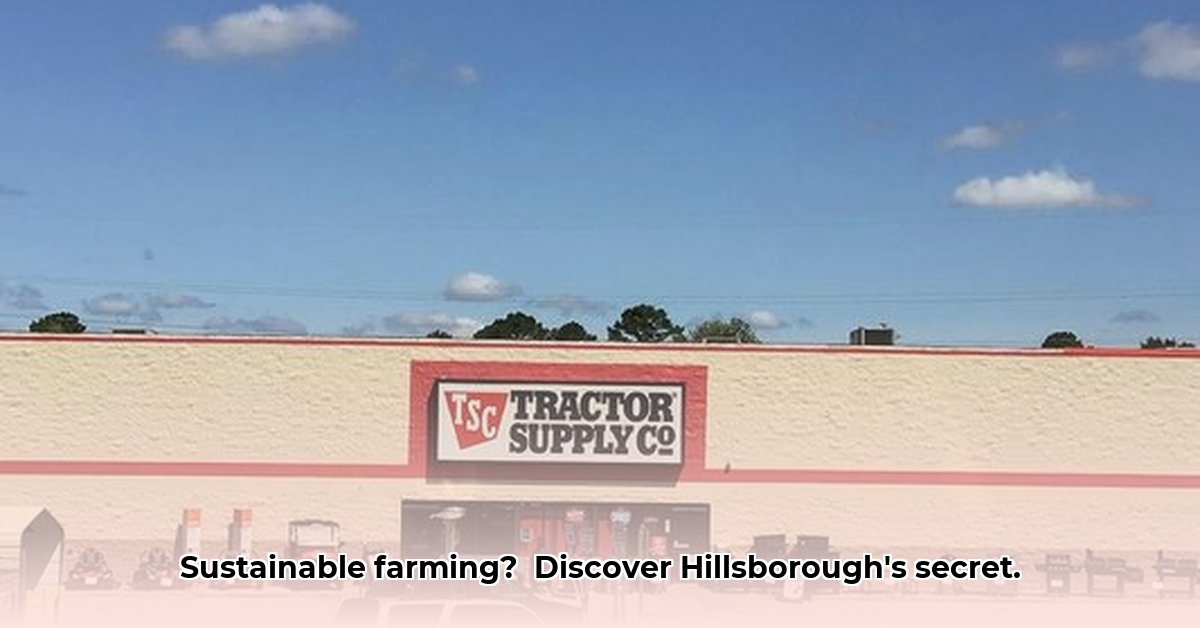
Hillsborough NC Tractor Supply: A Sustainability Assessment
Tractor Supply Company (TSC) in Hillsborough, North Carolina, serves as a vital resource for local farmers and gardeners. However, its contribution to sustainable agriculture requires a nuanced examination. This investigation analyzes TSC's product offerings, assesses their sustainability, incorporates stakeholder perspectives, and provides recommendations for improvement. The ultimate goal is to determine whether TSC truly supports sustainable practices within the community, beyond mere convenience. For comparison, see another local supplier's sustainability efforts here.
Hillsborough NC Tractor Supply: Inventory Deep Dive
TSC Hillsborough offers a wide range of products, from livestock feed to gardening tools. However, evaluating their contribution to sustainable agriculture requires careful categorization. Potentially sustainable items include organic seeds (though certification details remain unclear), some eco-friendly fertilizers and pest control products (with the caveat that "eco-friendly" needs stricter definition and verification), and potentially water-efficient irrigation systems (availability and range unspecified). Conversely, a lack of information regarding packaging recyclability, sourcing transparency, and transportation practices hinders a complete assessment. Do they prioritize local, sustainable suppliers? What measures minimize their carbon footprint during product delivery? These unanswered questions are critical.
Does the store's selection truly reflect a commitment to sustainable agriculture, or is it predominantly driven by market demand and profit margins? This needs further investigation.
Unpacking the Sustainability Puzzle: Data Gaps and Concerns
Available information paints an incomplete picture. While TSC offers some products aligned with sustainable agriculture, the extent of their commitment is uncertain due to significant gaps in transparency. The lack of readily available data on sourcing, packaging, and transportation practices significantly limits accurate assessment. For example, while organic seeds are offered, are they certified organic by recognized bodies? What are the environmental practices of the seed producers? Similar questions apply to fertilizers and pest control solutions – are the claims of eco-friendliness substantiated by verifiable data? The absence of this information prevents a comprehensive evaluation.
Local Voices: Stakeholder Perspectives on Sustainable Farming
Local farmers offer varied perspectives. Some appreciate the convenience and availability of necessary supplies. However, others express concerns about the limited selection of truly sustainable products and a lack of information on product sourcing and the environmental impact of production and distribution. Local NGOs and community leaders echo these concerns, highlighting the need for greater transparency and proactive sustainability initiatives from Tractor Supply. They see the store's potential impact on the community's transition to sustainable farming practices but emphasize that this potential hasn't yet been fully realized. How can TSC leverage its influence positively? This is a pivotal question.
A Roadmap to a Greener Future: Actionable Recommendations
Addressing the identified concerns requires collaborative action from all stakeholders.
For Tractor Supply:
- Conduct a comprehensive product audit: Evaluate all products, prioritizing those relevant to sustainable agriculture. Clearly label products with verified sustainability credentials (e.g., certified organic, recycled materials) and supply chain information.
- Publish a detailed sustainability report: Include sourcing information, packaging details, transportation practices, and established targets for improvement. Transparency is paramount.
- Invest in local and sustainable partnerships: Collaborate with local producers committed to sustainable practices to actively source more sustainable products.
For Local Farmers and Gardeners:
- Actively seek sustainable resources: Compare prices and product information at TSC and other retailers. Prioritize businesses with transparent and demonstrably sustainable practices.
- Advocate for change: Engage directly with TSC and other local businesses to demand a wider range of sustainable options.
For Consumers:
- Make informed choices: Carefully research products before purchase, examining labels for sustainability certifications and evidence-based claims.
- Demand transparency: Support businesses that prioritize transparency and demonstrate a commitment to environmental stewardship.
For Local Government and NGOs:
- Partner with TSC for educational initiatives: Collaborate on workshops and educational campaigns to promote sustainable agriculture within the community.
- Develop supportive policies: Create policies incentivizing sustainable farming practices and supporting local businesses that prioritize sustainability.
The Ongoing Conversation: Transparency and Accountability
This investigation serves as a starting point for a broader conversation about TSC's role in promoting sustainable agriculture. Further research is needed to fully assess their impact. However, the immediate need is for greater transparency from Tractor Supply regarding its sustainability efforts. Transparent practices, coupled with collaborative action from all stakeholders, can significantly accelerate progress toward a more sustainable agricultural future in Hillsborough and beyond. The future of our local farming community depends on it. How will we ensure environmental responsibility is prioritized?